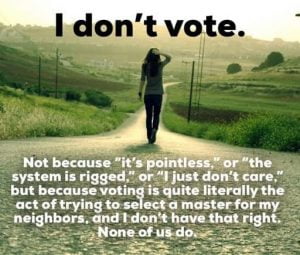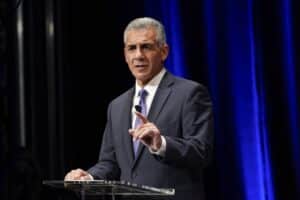This article was originally published by David Gordon at the Mises Institute.
Our aim ought not to be to make democracy “work better” but to use revelations of corruption as a tool to question altogether its value as a political and social system of organization.
Mollie Hemingway, an editor of the online magazine The Federalist, calls our attention in this well-researched book to a problem of vital significance. She is decidedly a partisan of Donald Trump and writes from this point of view, but whether you like the former president or not, you cannot ignore Hemingway’s message.
She begins the book with a paradox. Almost all the polls predicted a decisive win for Joe Biden in the November 2020 presidential election, but in fact, the result, setting aside altogether the allegations of rigged voting by the former president and his supporters, was very close: “The political class, the corporate media, and their pollsters were all dramatically wrong, and yet Biden would eke out a presidential victory of just under 43,000 votes across three states, out of a total of nearly 160 million”(p. 36. All page references are to the Amazon Kindle edition). Why were the polls so inaccurate?
One answer would be mistakes in the way polls were conducted, but Hemingway sees something more sinister in the errors. The inaccurate polls were part of a massive campaign by the government and corporate elite to ensure Trump’s defeat in the election. This campaign continued the efforts by the same elite to secure his defeat in the 2016 election and, when those efforts failed, to derail his presidency.
Hemingway stresses especially one tactic used in both the 2016 and 2020 elections. In previous elections, most voting took place on the appointed day in November, and although some people cast absentee ballots, these were of minor importance. No longer is this the case, and voting by mail now predominates. “’No excuse’ absentee voting allows citizens to cast their ballots early. With the widespread adoption of this practice in recent years, the United States can no longer be said to have an election day in the strict sense of the term. The country has a months-long voting season…. In 2016, absentee and mail-in ballots accounted for roughly 33 million of the 140 million ballots counted. In 2020, more than 100 million of the 159 million ballots counted were cast prior to Election Day, including by early voting” (p. 222). This is of great significance, Hemingway says, because fraud is much easier with this sort of voting: it is much harder to verify signatures and voters’ addresses.
If voting fraud is to be stopped, this requires vigilant election officials, and here is where the mass media elites enter the scene. Far from aiding in efforts to interdict fraud, the elites promote it through subventions to interested parties. Hemingway highlights the role of Mark Zuckerberg, who made large donations to private groups that acted in a partisan way to “help” election officials. “That’s to say nothing of the widespread privatization of election systems in key districts thanks to the efforts of leftist outfits funded by Mark Zuckerberg and other billionaires. Multi-million dollar grants to public election commissions, and the strings attached to them, were the means by which the left’s sprawling voting activist arm took over huge parts of the 2020 election…. This private interference in the running of a national election had never before happened in the history of the country” (p. xiii).
These efforts to bias election results go hand-in-hand with the attempt by the same elites to control information that reaches the public. The media giants, such as Facebook, Twitter, and Google, relentlessly promoted items unfavorable to Trump and suppressed stories that could have helped him. As an example, damaging news about Hunter Biden and his corrupt dealing with Chinese officials that emerged in the final days of the campaign and was published in the New York Post was banned from Twitter. “Twitter CEO Jack Dorsey would eventually tell Congress that censoring the New York Post and locking it out of its Twitter account was a ‘mistake’” (p. 36).
Hemingway’s focus is on the presidential campaign, but the censorship by the statist-corporative elite extends far wider. Facebook and YouTube ban videos that criticize covid-19 vaccinations and advance points of view that the proprietors of the platforms deem “misinformation.”
The author is prepared for the objection that her charges of a leftist plot to derail Trump reflects the biased perspective of a partisan. In response, she points to a notable article in Time magazine in which those involved in the machinations admitted and took pride in what they had done.
Without agony or shame, the magazine reported that “[t]there was a conspiracy unfolding behind the scenes” creating “an extraordinary shadow effort” by “a well-funded cabal of powerful people” to oppose Trump. Corporate CEOs, organized labor, left-wing activists, and Democrats all worked together in secret to secure a Biden victory. . . Time would, of course, disingenuously frame this effort as an attempt to oppose Trump’s “assault on democracy,” even as Time reporter Molly Ball noted this shadow campaign “touched every aspect of the election. They got states to change voting systems and laws and helped secure hundreds of millions in public and private funding.’ The funding enabled the country’s sudden rush to mail-in balloting, which Ball describes as ‘a revolution in how people vote” (p. 36).
What if anything can be done about this state of affairs? I do not think the solution lies mainly in stricter laws about voting and certainly not in governmental regulation of the mass media, which would only increase the power of the state. Rather, our aim ought not to be to make democracy “work better” but to use the example of corruption Hemingway has highlighted as a tool to help us throw into question altogether its value as a political and social system of organization, and defend in its stead a genuine free-market society, along the lines set forward by Murray Rothbard and his followers, who include most notably Hans Hoppe.
Hemingway is an assiduous researcher and, so far as I can discern, an accurate one. To my regret, I have been able to find only one outright error in the book. She says, “Five U.S, presidents since 1900 lost their bid for a second term. . . While each election is determined by unique factors, all five of these incumbents dealt with internal party fights or significant primary challenges. “(p. 39) This is not true for Herbert Hoover, one of the five she mentions, who did not get significant Republican Party opposition in his quest for the 1932 nomination. By calling attention to what has happened to our political system in recent years, Mollie Hemingway strengthens our resolve to come up with something better.

EDITOR’S NOTE: We are human beings. We can come up with a system that is better than slavery. We don’t have to devote our lives to worshipping rulers. It is time for us to evolve and abolish slavery for good. It is immoral and always has been.
President Trump is Breaking Down the Neck of the Federal Reserve!
He wants zero rates and QE4!
You must prepare for the financial reset




